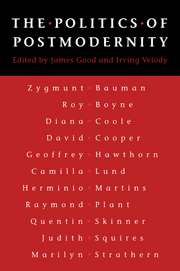Book contents
- Frontmatter
- Contents
- Acknowledgements
- Notes on contributors
- 1 Introduction: postmodernity and the political
- Part I Modernity and its vicissitudes
- Part II The critique of modernist political thought
- 6 Antinomies of modernist political thought: reasoning, context and community
- 7 Master narratives and feminist subversions
- 8 In different voices: deliberative democracy and aestheticist politics
- Part III Technology and the politics of culture
- Index
7 - Master narratives and feminist subversions
Published online by Cambridge University Press: 05 June 2012
- Frontmatter
- Contents
- Acknowledgements
- Notes on contributors
- 1 Introduction: postmodernity and the political
- Part I Modernity and its vicissitudes
- Part II The critique of modernist political thought
- 6 Antinomies of modernist political thought: reasoning, context and community
- 7 Master narratives and feminist subversions
- 8 In different voices: deliberative democracy and aestheticist politics
- Part III Technology and the politics of culture
- Index
Summary
Over recent years, a number of articles entitled ‘Feminism and Postmodernism’ have appeared. This is indeed a title I might have myself used, were it not for two misgivings. These are first, that such a formula is reminiscent of those which abounded in the days when feminism still saw its theoretical quest in terms of some yet unachieved grand synthesis, as in the influential ‘Unhappy Marriage of Marxism and Feminism.’ This quest, as feminists and postmodernists would now agree, is no longer on the agenda.
My second misgiving with such a formulation is that feminism and postmodernism are not commensurable as, for example, feminism and Marxism, or feminism and liberalism, were. In those cases, two explicitly political and modern ideologies, sharing interests in emancipation, liberation and justice, were being brought together. They could agree that one purpose of theory was to incite and guide political practice via the rational disclosure of certain truths about inequality or oppression, which might then be challenged. Neither a political ideology, nor claiming any critical insight into structures of stratification, postmodernism actually rules these out as politically suspect and theoretically illegitimate. It evokes only a mood, style or condition of contemporary culture, which it finds immune to representation. Thus feminism and postmodernism are quite different types of discourse, or language game, and the usual concern behind the titles conjoining them has actually been whether a feminism so thoroughly identified with modernity can survive its assault by postmodernists.
- Type
- Chapter
- Information
- The Politics of Postmodernity , pp. 107 - 125Publisher: Cambridge University PressPrint publication year: 1998
- 3
- Cited by



